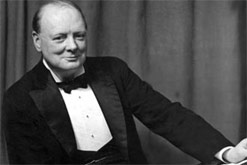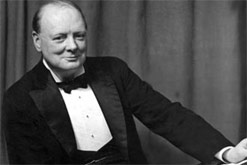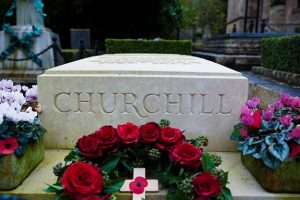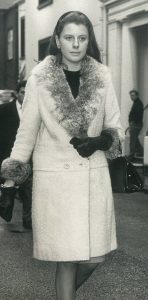
Finest Hour 166
My Life

July 24, 2015
Finest Hour 166, Winter 2015
Page 20
By Winston Churchill
 In 1935 Churchill wrote a series of articles for the News of the World describing major episodes in his life. Much of the material was lifted directly from his books My Early Life, Thoughts and Adventures and The World Crisis. In the lead article, entitled “Looking Back on Sixty Years,” however, Churchill offered some original observations that are excerpted here.
In 1935 Churchill wrote a series of articles for the News of the World describing major episodes in his life. Much of the material was lifted directly from his books My Early Life, Thoughts and Adventures and The World Crisis. In the lead article, entitled “Looking Back on Sixty Years,” however, Churchill offered some original observations that are excerpted here.
Sixty years! Not so very long ago I thought this a very advanced age.

2025 International Churchill Conference
Lately I have not felt the same impression. Sixty now seems to me to be a very reasonable age, when a man may still have vigour of mind and body with knowledge and experience besides. Politics, moreover, is a profession without any superannuation scheme. Till you are fifty you are a “young man of promise.”
I must admit that my son does not take this view. He thinks twenty-five is the age when wisdom and courage are united in their highest perfection. Anyone over thirty belongs to the “old gang.” My son must have inherited these ideas from me, because curiously enough I thought just the same at his age.
Another thing I have noticed is that one is more patient at sixty than at twenty-five. I wonder this is so. One would think it would be the other way round, that old men would be in a hurry, and young men would plan long years with shrewd calculation.
Certainly I have become more conservative in my outlook. When I was young I thought it was good to have things changed. They might be changed even for the sake of changing. The more they changed the better things would be. Now I feel quite differently. I do not feel the same confidence that “Progress,” as it is called, will continue to be favourable either to the Empire or to the liberties of our country.
There is a class who say, “All this Empire stuff is out of date. Let everyone ‘self-determinate’ how he pleases.” There is another class who say, “Who care for liberty? What we want is dictatorial authority. Some wonderful strong man who would order us all about should be substituted for our Constitution.”
But I am against all this. I am for limited monarchy and a free Parliament, and the undoubted glorious right of every Briton to criticize any government of which he is not a member. I do not know whether this is Conservatism or Liberalism. I hope it is both, and honest Trade Unionism, too. They all have an equal desire to dwell in a country where the people own the Government, and not in one where the Government own the people.
I think myself very fortunate to have been born a citizen in a liberal age in this great, free, and hitherto victorious country and Empire, with its incorruptible officials and impartial Courts; with its keen sense of humanity, fair play, and good sportsmanship; where every office and career is open to talent; where men can rise from the very humblest origin to the very highest stations; and with social services incomparably more complete than exist anywhere in the world. I do not think there has been anything so good in all history. I am proud to have been allowed to take some part in the affairs of such a society from time to time.
Of course, these have been very terrible years that we have lived through since the twentieth century began. Tremendous things have been happening in peace and war all over the world, and they have not ceased happening yet.
I must not, however, be drawn into these wide topics, because today I have to write about myself. I am not going to say I have never done it before, but I am certainly going to do it now.
It seems to me that I have had a wonderfully happy and fortunate life. I have never been idle. I have hardly ever passed a day without accomplishing something, and rarely without making something. Either it is a speech or an article, or some pages in one of my books; or reading with a purpose, or building a wall, or one of my numerous waterworks.
Everyone must work. The great majority have their work and their play, and their play is all the sweeter because of their work. A lucky few are those whose work is also their play and the main fascination of their life. This is so in the higher ranks of every profession, but it is particularly true of poets, artists and politicians.
My work has always been congenial, and usually profoundly interesting. It has always been my central interest. I have rarely needed a holiday, but only a change. One must have a change of scene and occupation from time to time in order to do more work, and do it better. I always wake up wanting to do something and nearly always find something to do. I do not understand those foolish people who waste their lives killing time till time kills them.
Quite apart from earning one’s living or discharging the duties which are set you, think of all the enthralling books there are to read, which you will never have time to read, and all the wonderful questions and subjects which you could study and learn about, but probably never will. Then there will really be no need for solving crossword puzzles or playing solo patience or twiddling your thumbs. Personally, I could easily plan three day’s occupation for every one I have.
The only drab period I ever really had was my school days. I went to school at seven, and did not escape till I was nearly eighteen—eleven years. These were bad years. I was an idle, unpunctual, untidy, shiftless, cheeky boy. I took no interest in Latin or Greek, and found mathematics very difficult. I was lacking in concentration, as I could not concentrate on things that did not interest me. I hated the school games even more than I hated the school work. No ray of success ever came to me either at work or play at school. Always looming ahead were horrible examinations, at which I nearly always did badly. No, those years were the only brown patch.
But I thoroughly enjoyed the Army, every bit of it. And since then I can truthfully say I have enjoyed each year more. Merely putting this down makes me uneasy for fear that the long and happy progression is going to stop. Still, it is a duty to be thankful for good health, good luck, and a happy disposition, and I trust the fates will not take it amiss!
In fact, I may say that my education really began when I left school. Certainly it has been continuous. I have always mingled with able, clever, leading people, and during all these years have had admirable information placed at my disposal in all the departments of which I have been the head.
I always wanted to go into Parliament. From my earliest years I heard politics talked around my father’s table.
I met at my father’s house, and was very kindly treated by, most of the leading figures of that great Parliamentary age: Mr [Arthur] Balfour, Mr [Joseph] Chamberlain, Mr Edward Carson, also Lord Rosebery, Mr [Herbert] Asquith, and Mr John Morley. Other fascinating ministerial figures were from time to time at his table, and I heard not only colleagues but opponents amicably exchange opinions on the burning topics of the hour.
It seemed a very great world in which these men lived, a world where high rules reigned and every trifle in public conduct counted; a dueling ground where, although the business might be stern and the weapons loaded with ball, there was a ceremonious personal courtesy and mutual respect. It seemed to me that here was a society which it would be the greatest privilege and honour to enter, and I made up my mind to do so as soon as I could win my independence.
At my father’s death I inherited no material goods. From a little after I was twenty-one I became self-supporting.
But though I had no worldly wealth except what I could earn by writing, and my small pay as an officer, no fine country home, or shop, or factory, or business which I could step into, nevertheless my father left me a rich inheritance in the prestige of his name and the many powerful friends who cherished his memory. I saw at once that these treasures would be of no use to me unless I tried to be worthy of them.
I resolved to throw myself into life’s battle with the utmost seriousness and energy, to repair the neglects of my school days, to read and study, to think and fit myself, as far as I could, to mingle in the great world of politics in which [my father] had lived; and to seek adventures of all kinds in the hope of winning distinction. These adventures were certainly not slow in coming.
Subscribe
WANT MORE?
Get the Churchill Bulletin delivered to your inbox once a month.
Oops! We could not locate your form.
Privacy




